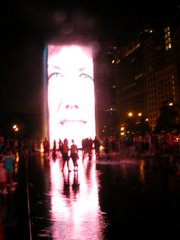I had a chance to see Rudy Giuliani speak at the Italian American Sports Hall of Fame in Chicago on Friday. While I don't necessarily have too much reference point, I do believe that in most ways this was much like any campaign towhall meeting and speech. It was still quite illuminating nevertheless.
I believe you can tell a lot about a candidate's agenda by what they focus on during such a meeting. The first policy that Rudy spoke about was illegal immigration and how important it is to finally get a handle on it. His newfound commitment towards combatting illegal immigration will no doubt be met with skepticism and controversy by many of my conservative colleagues. Unfortunately, it is one of those debates that is in many ways pointless. There will be plenty that will look at his prior New York City record and concluded based on past performance that he isn't serious. There will be those like me that will look at his current plan for illegal immigration and say he always gets accomplished what he sets his mind on. His plan involves beefing up the border patrol, building a fence technological and real, and creating a tamper proof ID card. Thus, take it for what it is worth.
His thoughts on the GWOT were no doubt general. His first thought vis a vis the GWOT is that we must stay on offense. This has became his calling cry with regards to this issue. He believes in victory in Iraq and he defined that as an Iraq that is an ally not an enemy in the GWOT. He believes that it is NOT an option to allow Iran to get nuclear weapons. He also mentioned that Pakistan must be worked on though frankly besides vague ideas his plan was short on specifics. Some might take this as a sign that he may not be the right person however I would humbly disagree. Rudy has a long and very successful history in confronting and beating bad guys. As U.S. Attorney, he took on and defeated the mafia in his district. As Mayor of New York City, he took on the criminals and beat them lowering crime dramatically. He has a history of taking on bad guys. He has a history of beating them. While the terrorists may not be a perfect comparison to the bad guys he has a history of beating, his prior accomplishments can't be ignored when determining the best terror warrior.
The most fascinating portion of the meeting, for me, came in his answer regarding health insurance. Rudy's plan to revolutionize health care is entirely conservative. The hallmarks are lower taxes, health savings accounts, and market principles. He believes that much of the problem comes in the fact that people don't usually choose their own health insurance. Since most get it through work, it is essentially chosen for them. As such, when it comes to health insurance, people aren't the dutiful consumers that they are towards other products and services. Through credits, tax breaks, and health savings accounts, Rudy believes that individuals will be able to not only buy their own health insurance but at a lower cost than they normally do. In many ways, Rudy's vision of health care mirrors that of John Stossel's. Consumers drive down the price of everything and drive up the quality, and we must give the consumer choice back to the individual. He does it through health savings accounts, credits, and tax breaks. He also pointed out that our litigious society has created an environment of defensive medicine and higher costs. He proposed that the loser of any lawsuit must pay for the costs of both parties to limit many of the more egregious lawsuits.
On taxes and spending, Rudy tried to wake up the echos of Ronald Reagan. He stressed over and over his commitment to limiting the size of government. It was his solution to a whole host of economic related problems. He pointed out that limiting the size of government is largely done through leadership. He pointed out that none of his deputies in New York City ever came to him asking to make the budget for their respective department smaller. Thus, it was ultimately up to him, the Mayor, to stand firm in limiting the size of government even if he had to take on his own administration to do it.
He spoke about productive and unproductive taxes. An unproductive tax is one that is among the most extreme when compared to the civilized world. For instance, he pointed out that our corporate income tax is one of the highest in the entire civilized world. He said that if we merely lowered our tax so that is closer to the middle not at the top that it would keep a lot of the business we lose. He said his tax policy would focus on identifying and lowering those taxes that he determined to be unproductive.
He ended the meeting with an answer to something dear to my heart, the mortgage crisis. He said that he thought Paulson's plan to freeze rates was a good idea. I was quite put off by this question, and and if you want to know why please read this. He also said something very interesting right afterwards. He said that he believed that it was a good idea especially in light of pending Congressional action. I took this to mean that this was the least of two evils. If freezing rates means halting action on such things as H.R. 3915, then while it is still not a good idea it might be better than the alternative.
He was asked how he would confront the mortgage crisis, and this he answered perfectly. He pointed out that the duty of the President is NOT to focus on any given segment of the market but rather to be a proper momentum builder for the economy as a whole. He believed that shrinking government and waste would not only strengthen the economy but the housing market. One can take this as a canned answer, and to some extent it is, however I personally find it a positive that a Presidential candidate doesn't feel the uncontrollable urge to tinker with every portion of the economy that may be going wrong at any given time.
The meeting was revealing not only for what he said but what he didn't say. There was absolutely nothing about any social issues. Clearly, Rudy is trying to downplay his socially liberal record as much as possible and frankly his supporters didn't much care because there were no questions. I was surprised that he didn't touch at all on judges as well, though I assume his public unabashed support for strict constructionists holds. He also said nothing about guns or the environment as well. Rudy took out a lamenated card that had his twelve commitments. That is where I believe his focus will be in his administration. If you are worried about Rudy's position on any matter, check the twelve commitments. If that position isn't on there that, it is unlikely his administration will spend much time on the issue anyway.
All in all, I found Rudy to be quite charismatic and charming, still maybe not quite Mike Huckabee, but charismatica and charming nonetheless. At one point, a voter revealed that not only was he a supporter but also a registered Democrat. Rudy, spontaneously, came over and gave the man a big bear hug. I continue to maintain my support for him, and all reasons stand. He is a proven leader. He has a proven track record. He has a proven history of shrinking government, cutting waste, cutting taxes, expanding choice, and confronting bad guys. In this day and age, I believe that is exactly what we need.
Monday, December 10, 2007
Rudy On Leadership, the GWOT, Healthcare and More
Labels:
Charter Schools,
GWOT,
Health Care,
President,
Rudy Giuliani,
Taxes
Subscribe to:
Post Comments (Atom)











2 comments:
Mike,
I was at that town hall meeting as well. I was the guy who asked the question about "Team of Rivals" and the election of 1860. I thought Rudy did a great job. Rudy was able to convince my skeptical friend that I dragged with me.
That was a very interesting question, though, don't take this the wrong way, but the book actually sounds even more interesting. I thought he did well. The thing that comes across is how much sensible experience he has. His point about no department head ever wanting to decrease their budget is the type of experience he brings that others simply don't.
I also really liked his story about the two sons of his friend. One son was playing with the new I Phone while the other one was reading some sort of a business journal. He asked the one son why he didn't get the I Phone and the guy replied "because it will be half as much in six months". Rudy replied, "we know which son is going to be the billionaire in this family".
He was making an overall point about consumerism when that story came up but the story is just one of many examples of his sensibility.
Post a Comment